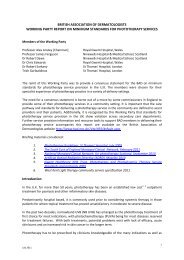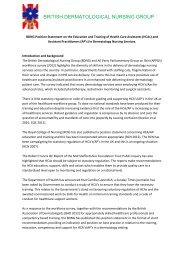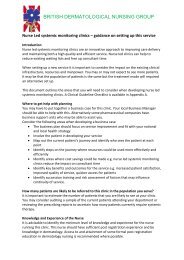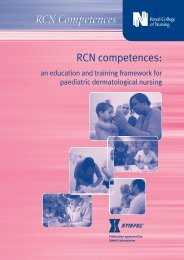Improving outcomes for people with skin tumours including melanoma
Improving outcomes for people with skin tumours including melanoma
Improving outcomes for people with skin tumours including melanoma
Create successful ePaper yourself
Turn your PDF publications into a flip-book with our unique Google optimized e-Paper software.
<strong>Improving</strong> Outcomes <strong>for</strong><br />
People <strong>with</strong> Skin Tumours<br />
<strong>including</strong> Melanoma<br />
Organisation of <strong>skin</strong><br />
cancer services<br />
Observational studies of the <strong>skin</strong> cancer surveillance role of trained<br />
nurses have considerable variability but provide evidence that, after<br />
appropriate training, nurses can demonstrate high recognition rates <strong>for</strong><br />
suspicious <strong>skin</strong> lesions.<br />
MDT working<br />
3<br />
The benefits of the model of MDT working have been emphasised in<br />
all of the series of guidances on cancer services published by the DH<br />
and NICE. The model has been designed to meet the needs of <strong>skin</strong><br />
cancer patients and those providing service to them. The psychosocial<br />
benefits of the services that a CNS can provide are discussed in the<br />
chapter on ‘Patient-centred care’ and the <strong>Improving</strong> <strong>outcomes</strong><br />
guidance series, as are the benefits of the roles of members of the<br />
extended team.<br />
Clinical guidelines produced by expert bodies in the UK support<br />
multidisciplinary care as the model of care <strong>for</strong> patients <strong>with</strong> <strong>skin</strong><br />
cancer. UK guidelines <strong>for</strong> plastic surgery services strongly support<br />
multidisciplinary management of patients <strong>with</strong> <strong>skin</strong> lesions and<br />
recommend appropriate training and accreditation <strong>for</strong> all clinicians<br />
who per<strong>for</strong>m <strong>skin</strong> surgery.<br />
Audit evidence from the UK suggests that, to date, progress has been<br />
slow in setting up effective <strong>skin</strong> cancer MDTs that meet the standards<br />
set out in the Manual of Cancer Services Standards.<br />
One retrospective analysis of multidisciplinary <strong>melanoma</strong> care found it<br />
to be cost-effective.<br />
Evidence from three expert opinion articles that describe the<br />
experiences of dedicated multidisciplinary <strong>melanoma</strong> centres suggests<br />
that a multidisciplinary approach can offer further services in patient<br />
education, psychosocial support and rehabilitation. This approach is<br />
reported to increase staff enthusiasm and promote better coordination<br />
and communication via nurse coordinators, and also to improve cost<br />
efficiency. One multidisciplinary <strong>melanoma</strong> unit reported that<br />
specialist centres that treat high numbers of patients <strong>with</strong> <strong>melanoma</strong><br />
encourage adherence to evidence-based guidance and the<br />
maintenance of standards <strong>for</strong> technically demanding surgical<br />
procedures.<br />
70<br />
National Institute <strong>for</strong> Health and Clinical Excellence















